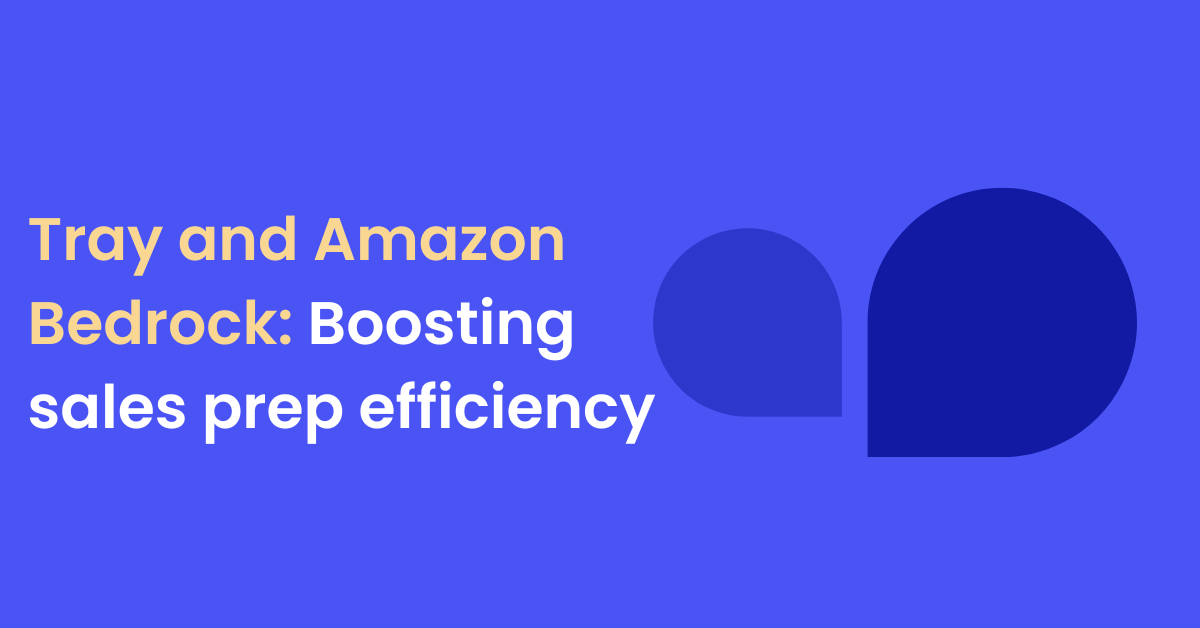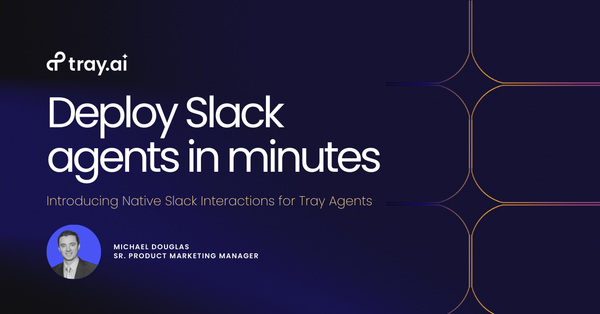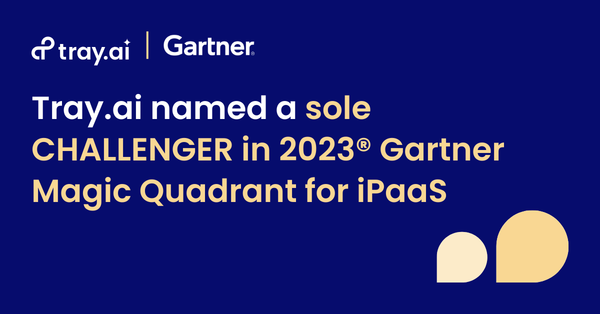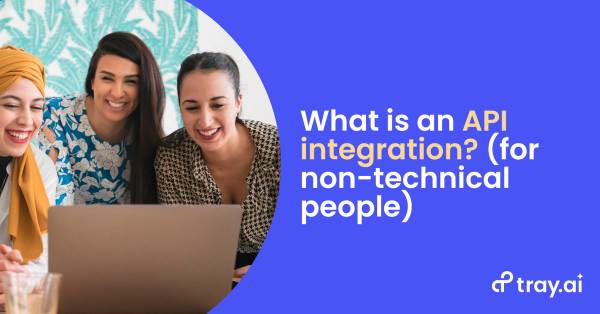Amazon Bedrock is one of the easiest ways to build and scale generative AI applications with foundation models. It is a fully managed service that provides access to a variety of powerful foundation models (FMs) for text and images, which lets businesses build and deploy generative AI applications efficiently.
We’re excited to announce that you can now integrate with Amazon Bedrock within the Tray platform. Let’s dive into what this means for you, the security and privacy benefits of Amazon Bedrock, its support for model interoperability, and the introduction of frontier and open-source models.
Easily integrate Amazon Bedrock with Tray
Tray.ai’s new flagship Amazon Bedrock connector lets users leverage Amazon Bedrock's powerful foundation models for text and images, enhancing Tray’s automation capabilities. Our AWS Bedrock connector highlights the growing ecosystem around Amazon Bedrock, enabling various platforms to leverage its capabilities for building generative AI applications.
Tray and Amazon Bedrock: How our Executive Meeting Prep Accelerator maximizes sales efficiency
One way we are helping customers deploy automations (and use internally) that leverage Amazon Bedrock is with our AI-powered Executive Meeting Prep Accelerator.
How long does it take you or folks on your sales team to prepare for an external call? You have to look up information from your CRM on the company, person, and any open opportunities. Add in a LinkedIn search. If you are hitting the gold standard, you check for news on the company to understand what their goals are. The whole process should only take 15 minutes, right?
Let’s do the math. If you calculate 10 minutes per person for each call, and consider that most calls involve at least 2 external participants, and you have 4 such calls daily throughout the week, that totals to a minimum of 400 minutes per week, which equals over 6.5 hours. Essentially, you’re dedicating nearly a full working day each week just to prepare for calls.
And this applies to everyone in the sales org. So it’s not just your time, it’s potentially a collective drain on resources. If there were a way to improve and optimize this process without requiring additional time investment, wouldn’t that be worth exploring??
It’s easy to make AI drive results like this on Tray. Our multi-agent framework can be triggered by any event in your tech stack. Here is how we set it up with AWS Bedrock using the new Claude 3.5 Sonnet model:
- Create a scheduled workflow to run every weekday at 5 am. Tip: Use can use a Chron expression for this 0 5 * * 1-5
- Lookup your calendar events
- Only process the ones with folks not working at your company
- For each person, invoke your Tray Multi-Agent to research the person for you
- Our version (which is coming soon as an AI Accelerator, but if you want early access reach out in the Tray Slack Community) uses Sub-Agents and tools such as: AI Planning, CRM lookup, Company enrichment, Google search, Writing composer, Self-Evaluation
- All the AI steps within the agent are running on Amazon Bedrock, so we know the data we process is secure and private to our instance of AWS. No data retention. No training the models. Full compliance.
- Send a Slack Digest to yourself with the research
- Drive value for your customers and ace those meetings
Security and privacy benefits
Amazon Bedrock offers several security and privacy benefits, ensuring a secure environment for developing and deploying generative AI applications:
- Guardrails: Guardrails for Amazon Bedrock evaluates user inputs and foundation model responses based on use case-specific policies, and provides an additional layer of safeguards regardless of the underlying FM. Guardrails can be applied across all large language models (LLMs) on Amazon Bedrock.
- Data protection: Amazon Bedrock ensures data protection by not storing or logging prompts and completions, and not using them to train AWS models or distributing them to third parties.
- Compliance and security standards: Amazon Bedrock is built on AWS's robust security framework, which includes compliance with various security standards and regulations. This ensures that applications built on Bedrock adhere to high security and compliance standards.
- Network security: Leveraging AWS's protected network, Amazon Bedrock is designed to shield applications and data from external threats, ensuring a secure environment for running generative AI applications.
- Encryption: Both data at rest and in transit are encrypted, ensuring that sensitive information is protected from unauthorized access. These benefits collectively ensure that AWS Bedrock provides a secure and compliant environment for developing and deploying generative AI applications.
Model interoperability
Amazon Bedrock supports model interoperability, providing access to a variety of high-performing foundation models from leading AI companies. Here are some key aspects of its interoperability:
- Connector for interoperability: The AWS Bedrock Connector simplifies prompt engineering across models, allowing users to focus on performance.
- Foundation models: Amazon Bedrock offers a choice of foundation models from different AI companies, allowing users to select and use models from various providers within the same platform.
- Custom models: Amazon Bedrock allows for the import of custom models, enabling users to bring their own models into the Bedrock environment, enhancing interoperability.
Frontier and open-source models
Amazon Bedrock supports frontier and open-source models, including Anthropic's Claude Sonnet 3.5 and Meta's LLaMA 70B.
Anthropic's Claude Sonnet 3.5
Anthropic Claude 3.5 Sonnet is their latest AI model, designed to tackle a variety of advanced tasks. It sets new standards in graduate-level reasoning, undergraduate-level knowledge, and coding skills. Claude 3.5 Sonnet stands out for its improved vision capabilities, better performance in writing and translating code, handling multistep workflows, and interpreting charts. This model competes with other advanced AI models like GPT-4o and Gemini 1.5 Pro.
Meta's LLaMA 70B
This model is intended for a variety of applications, such as language modeling, text generation, and dialogue systems. It’s fine-tuned for various tasks to improve its performance in specific scenarios. Meta’s LLaMA 3 70B has shown to provide better answers compared to models like GPT-4 in certain contexts, offering more detailed and well-formatted responses at a lower cost. Meta has made theLLaMA models available for free for research and commercial use, promoting openness and inclusivity in the AI community.
Tray and Amazon Bedrock
Amazon Bedrock is transforming the AI and cloud computing space by providing a secure and interoperable API for developing and deploying generative AI applications through Tray.
This connector highlights our commitment to AI services that offer robust security and privacy features, ensuring a safe environment for innovation.
Ready to get started? Get up to speed quickly by checking out our library of ready-made AWS Bedrock templates.




